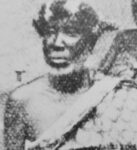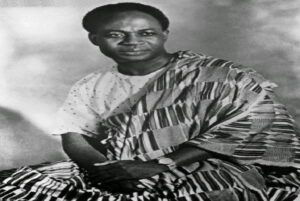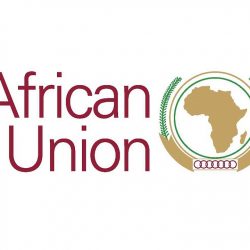MENSA BONSU
Mensa Bonsu (circa 1840 – April 21, 1896) was Asantehene from 1874-1983. In the earlier part of his reign he launched a program of reconstruction designed to strengthen the Asante nation, but later on his policies of domestic repression brought about his overthrow.
He was the third son of the Asante Queenmother Afua Kobi by her marriage to Kofi Nti, Okyeame (spokesman) for the Boakye Yam Panin stool. He was, therefore, the junior brother to Kofi Kakari (q.v.), Asantehene from 1867-1874.
Taking office in the aftermath of the campaigns of 1863-1874 against the British and their allies, which had drained the nation’s reserves, he committed himself to a program of peace, trade, and national reconstruction. Paradoxically, however, his first major undertaking was to preside over a campaign against Dwaben, a founding state of the Asante Union, located 15 mi (24 km) northeast of Kumase, whose ruler, Asafo Agyei (q.v.), had renounced allegiance to the Asantehene. In November 1875 Asafo Agyei was defeated, and with his adherents found refuge in the Gold Coast Colony to the south. Mensa Bonsa then turned his attention to the tasks of reconstruction.
He initiated projects to strengthen both the Asante civilian and military administrations. Under the direction of Owusu-Ansa (q.v.), the nucleus of a new “civil service’’ was created, to which, among others, a number of Europeans were recruited. At the same time new units were added to the army, consisting of professional soldiers trained in the use of the most up-to-date weaponry. The offer of high rates of pay induced many to leave the Gold Coast Armed Police Force and to enter Asante service as drill and weapons instructors. In order to finance these developments, Mensa Bonsu was obliged to pursue fiscal policies designed to increase revenues. The level of general taxation was raised, and the schedule of legal fines revised. Opposition to his domestic policies soon became manifest. In 1877 an attempt to overthrow him and to restore Kofi Kakari to office was averted. A more serious threat presented itself in 1879-1880, with the growth of the highly organised and nationalistic Domankama movement, committed to a return to the old traditional values of the early Asante kingdom. Early in 1880 members of the movement broke into the palace and attempted to assassinate Mensa Bonsu. The Asantehene ordered a purge of the movement, and henceforth his personal behaviour was to become markedly erratic and his rule harsh.
Paradoxically, while Mensa Bonsu’s domestic policies became increasingly repressive, his conduct of external affairs remained restrained and statesmanlike. The use of military force against rebellious provinces in the northern hinterlands was rejected, and only economic sanctions were employed in the attempt to restore Asante authority there. In the south, despite the provocative policies of the British administration of the Gold Coast Colony, Mensa Bonsu consistently sought negotiated settlements. The large peace mission which he sent to the Gold Coast in 1881, under the able leadership of Boakye Tenten (q.v.), proved to be a diplomatic tour de force which averted a new Anglo-Asante war.
By 1882, as a result of the repressive internal policies, Mensa Bonsu had lost the confidence of all but a small palace clique. The rural areas were everywhere in a state of revolt. Finally, early in 1883, the commoners of the capital seized control of the town and confined Mensa Bonsa to his palace. On March 8, a number of his senior functionaries gained access to the palace, and took Mensa Bonsu into custody. He was declared destooled, and banished from Kumase. He withdrew from public life, but was later allowed back to the capital where he lived in considerable poverty. On the British occupation of Asante in 1896, he was arrested and sent under escort to the coast. On the way, however, he died at Prasu, 55 mi (88 km) north of Cape Coast, on the Pra river, on April 21. Rumours suggested that he had poisoned himself, or had been poisoned, but the official reports identified dysentery as the cause of his death.
Mensa Bonsu’s reign was one of the lost opportunities. Committed to policies of reconstruction which might well have reunified the nation, his failure to handle effectively the problem of internal opposition inevitably created the conditions of his downfall.
IVOR WILKS






